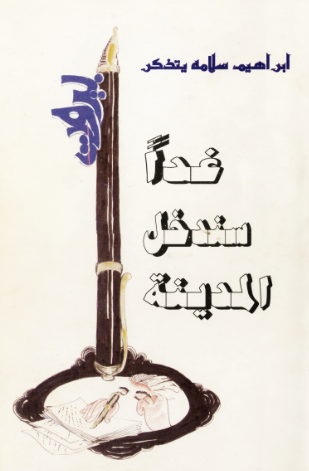Tomorrow, We Will Enter the City-Ibrahim Salameh
Salameh was taken captive by the ‘printed word’ by sheer fluke of coincidence when, one day, he arrived late to his Baccalaureate exam. He published his first article in the Telegraph, making his first foray into journalism. Salameh moved across different Lebanese journals and magazines in the country and abroad, from Salim al-Lawzi’s weekly Al-Hawadeth, to Said Freiha’s As-Sayyad to George Abou Adal’s Ousbouh al-Arabi, all the way to As-Sahafa, Al-Mouharrer and Al-Mustaqbal. Yet, he kept his special column alive and echoed no other voice than his own.
In his book, Salameh evokes his relationship with the Arabs on the left of the political spectrum. His journey with politics and parties began at the tender age of 14 at the official high school of Ashrafieh. His classmates were divided between nationalist Syrians and communists whereas he was magnetized by Abdul Nasser. Occasionally, the author reminisces about several junctures that could undermine the credibility of the profession at those perturbed times: “After September 1970 and the absence of Abdul Nasser, Al-Hawadeth’s editor in chief Salim al-Lawzi came to me with a surprising cover suggestion ‘From Mustafa... to the Jews of Israel’, meaning a call for reconciliation between the Arabs and Israelis. I frankly asked him if the magazine had a fourth editor-in-chief so he said ‘who are the other three beside me and you?’ I replied ‘King Faissal, the Crown Prince of Kuwait Sheikh Jaber Al-Ahmad, Golda Meir, the Shah of Iran...’ He deplored and blurted out an immoderate retort ‘if one has reached an understanding with the CIA, is that a big problem for the Arabs?”
Salameh was keen to retell the event, the encounter or the dialogue in its raw form, even when that meant raising several question marks. At certain junctures, the reader gets the impression that this feature in particular has afforded the author ample margin to dare sometimes to say what should not be said.
to dare sometimes to say what should not be said.
 to dare sometimes to say what should not be said.
to dare sometimes to say what should not be said. The author did not hesitate to mention the discontent of Jihan, wife of Anwar Sadat, with Um Kulthoum who was accustomed to calling him ‘Abou Nour’ in her concerts, until the ‘unfortunate evening’ came in the winter of 1971. Salameh showed no reluctance in recounting how Jihan never returned the pearl necklace she had borrowed from Souad Al-Sabbah, wife of Kuwaiti Prince Abdallah Moubarak, thus severing the relations between Egypt and Kuwait.
To the rhetorical question raised at the end of the memoir of whether or not ‘the Western policy has failed in countries such as Egypt, Syria, Lebanon and Tunisia’, Salameh answers a definite and double ‘yes’.








Leave A Comment